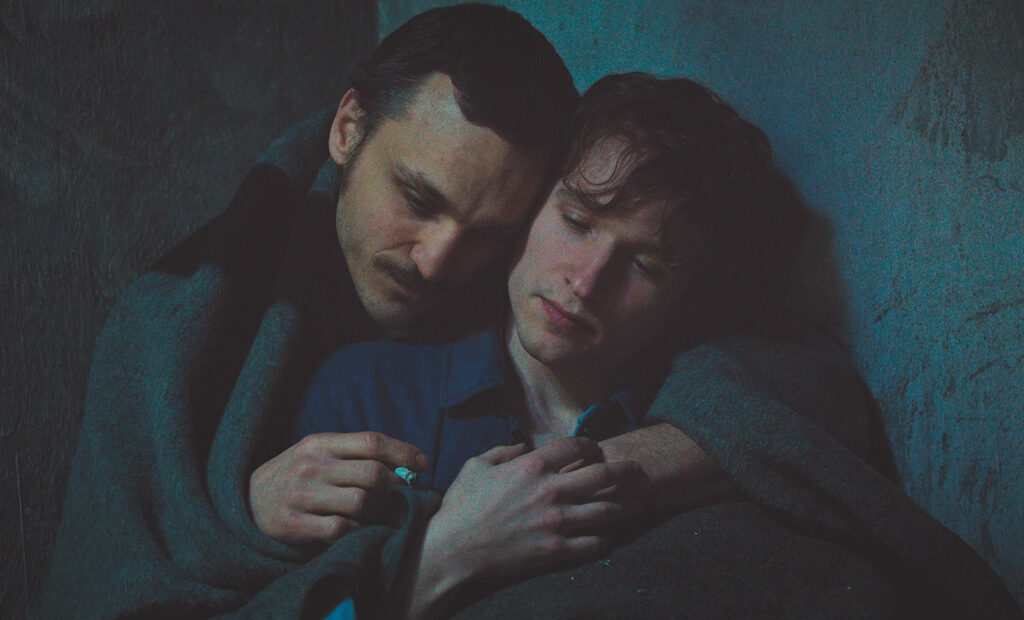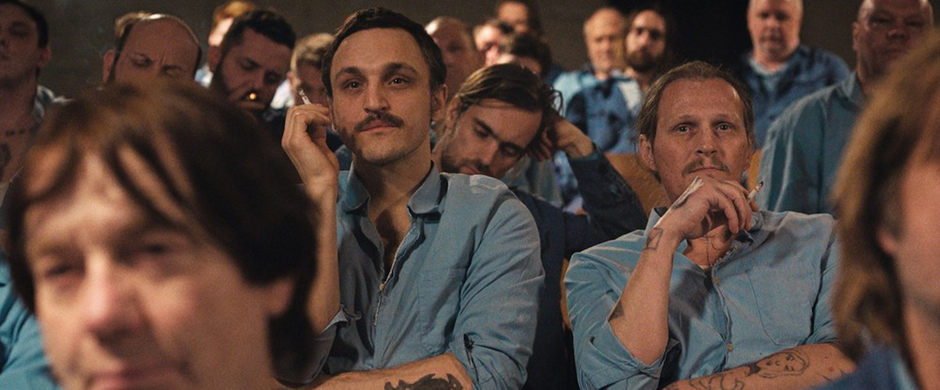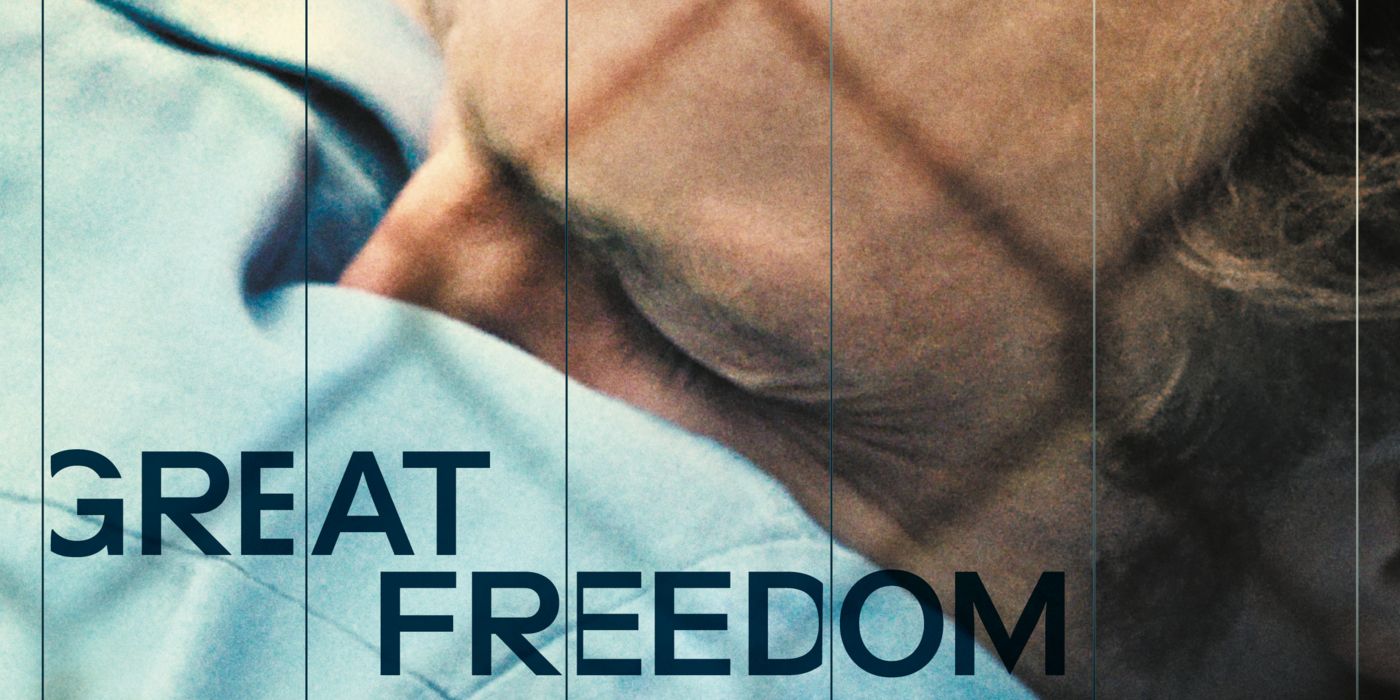By Ermioni Pavlidou,
Since March is the month dedicated to the Academy Awards, I decided to talk about Große Freiheit (2021) — German for Great Freedom —, which is Austria’s official nomination to the 2022 Academy Awards that made the shortlist. The post-war German queer prison drama by the Austrian director Sebastian Meise is the winner of the 2021 Festival de Cannes Un Certain Regard Jury Award. It was written by Sebastian Meise and Thomas Reider. It follows the “prison course” of Hans Hoffman (Franz Rogowski), a gay WW2 concentration camp survivor, who is repeatedly sentenced to prison — as shown in three different eras both of himself and of time in general — for homosexuality, according to “paragraph 175”. Spoilers ahead.
The movie begins with a silent montage of cuts of men secretly and cautiously engaging in sexual acts in a public bathroom, which later is explained to be police footage used as evidence to convict Hans for lewd homosexual acts. He seems to be overly confident and familiar with the whole “locking up” procedure, being in total sync with the guards and following orders before he is even asked to. There, his unusually casual behavior is explained through the reaction, to seeing him “inside”, of another inmate, Viktor Kohl (Georg Friedrich), with whom he seems to be well acquainted. As the first act progresses, he is sent to isolation for defending another “paragraph 175” inmate, and this is the place and point which binds his other two significant “visits” to prison. The solitary confinement resembles a dungeon, with the only light source being the cigarettes sent to him by the aforementioned old acquaintance; and functions as a time machine exchange between memories of the different times he had ended up in it. Like the phantoms of the past in the classical story of Scrooge, with one consistency: Viktor being throughout them.
The current — and stable-between-switches — point of narration is the year 1968. With the flicker of the light and the trembling whimpers of Hans, we are transferred to 1945. LGBTQIAP+ members were immediately sent to prison after concentration camps. This is Hans’s first time in prison. He is younger, visibly in worse shape, with a pale face and unhealthier body, and his fear is evident, though it is not clear whether it is the PTSD fear of the things he experienced during the war or the weariness for prison’s unknown. The — later-to-be-determined — most consistent person in his life, who is present in all of the three chronological sections is his first cellmate: Viktor.

Viktor is convicted for murder and has an aggressively homophobic reaction, when he learns that his cellmate is serving time, according to paragraph 175. Eventually, they form a vague, yet powerful bond through mutual sacrifices, Viktor, who is an amateur tattoo artist, covers Hans’s traumatic tattoo with his camp number and Hans takes the blame for having the tools, found during a cell inspection, which lands him in solitary; where he receives the first pack of cigarettes by Viktor, as a sign of gratitude. The turning point in their relationship and Viktor’s soft side has now started to unravel. He even asks Hans to get him cigarettes when his sentence is completed, but — as we find out later — he never does.
The second period the flashbacks lead to is 1957. Hans is sent to prison because he is caught being in a relationship with a man he loves, Oskar (Thomas Prenn), who is also captured along. He tries to rationalize the situation with him and promises him that life will be better once they get out of prison. He romanticizes the future as prison-free. Oskar is unable to perceive Hans’s optimism that is based on something intangible and ambiguous such as love that contradicts the law, which interferes with said expressed love’s free completion. This leads to him taking his life, realizing he cannot run or fight to be himself. The mutual care and dependency between the Viktor-Hans dynamic is once again shown when Viktor delivers the devastating news to Hans and immediately embraces him warmly and reassuringly; that is reciprocated filled with need in deep grief.
Lastly, the main narration axis: 1968-1969. Hans’s return to prison is an ongoing joke between him and Viktor. It is now apparent that their relationship is a loud but also silenced truce between them. Hans gets involved with a young man, Leo (Anton Von Lucke), also convicted by paragraph 175 and who was also shown in the first montage. He quickly helps Leo lawfully escape prison when he feels that history is about to repeat itself, proving that his life has been circling around the only consistency in it: Viktor. And specifically, Viktor in prison. His final decision to return to prison after being released from it is justified by Viktor being the man he had grown to be around. They experience a milestone in human history together: the live broadcast of the first moon landing. Hans helps Viktor handle his addiction to drugs; whilst thinking and proposing a life with him and escaping somewhere. Another milestone that happened in 1969 was the withdrawal of the brutal paragraph 175, rendering Hans a free man.

The film ends in the same way it had started. A video clip-like shot of a newly legal gay club, only this time it is not in a dimly lit public bathroom corridor nor does it feel illegal. Hans decides that instead of exploiting his freedom, he will purposefully go back to prison by robbing a jewelry store, waiting nonchalantly, smoking patiently with a pack of cigarettes in hand to actually give to Viktor this time; referring to going back to the life he could not — and maybe did not want to — escape.
In a nutshell, Great Freedom is worthy of its earned award, and, since March is the month dedicated to the Academy Awards, we can only imagine it being a top-tier movie — perhaps earning an Oscar or two on its way to glory. In addition to that, Great Freedom is driven, apart from its engaging scenario and beautifully inventing cinematography, by Rogowski’s exceptional acting. He portrays a man who, in his course of hardships, manages to keep peculiarly steady things in his life: he forms an intimate and beautiful in all its straining background, relationship with a confused and literally trapped man. It is a “frenemies” to lovers transition trope. He pays a respectful tribute to the role.
References
- ‘Great Freedom’ Review: A Gay Convict Bides His Time for Change in This Terrific German Prison Drama, variety.com, Available here
- Don’t Overlook Austria’s Gay Prison Drama ‘Great Freedom’ in the International Oscar Race, indiewire.com, Available here
- Great Freedom, berlinbeyond.com, Available here




